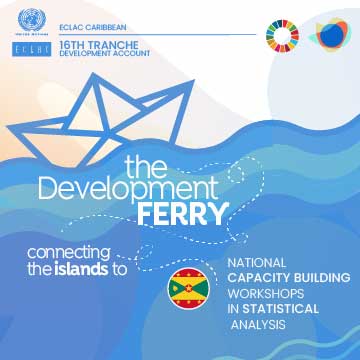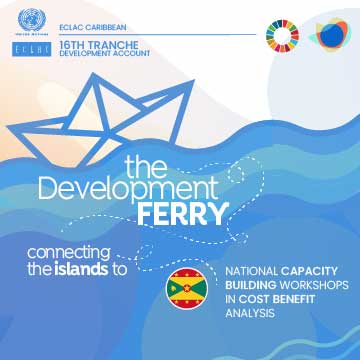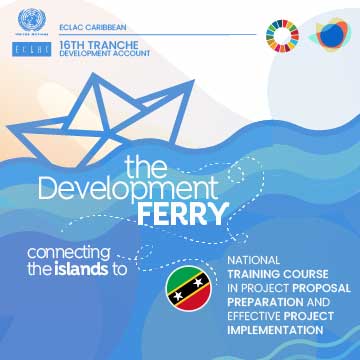National capacity building workshops in cost benefit analysis - St Lucia
Work area(s)
Teaser
The overall objective of the training is to strengthen the skills level of policymakers and technical officers of the Government of Saint Lucia in cost-benefit analysis which will enhance their ability to design and implement data-informed policies and strategies for accelerating the achievement of the Sustainable Development Goals (SDGs) and building a resilient economy.
Event information

Date
30 Jun - 04 Jul 2025, 09:00 - 17:00Event type
Participation
Background
The Economic Commission for Latin America and the Caribbean (ECLAC) subregional headquarters for the Caribbean is currently implementing a Development Account (DA) project titled “Strengthened capacity to design and implement policies to enhance resilience in Caribbean SIDS.” Under the 16th tranche of the Development Account, the objective of this DA16 project is to strengthen national capacities of Caribbean countries to design and implement policies and strategies for accelerating the achievement of the Sustainable Development Goals (SDGs) and building resilient economies. Six Caribbean countries, namely, Antigua and Barbuda, Belize, Grenada, Saint Kitts and Nevis, Saint Lucia, and Suriname will benefit from the project, which is expected to enhance the technical skills of decision-makers of the target countries in the development of policies and projects to promote sustainable development and build resilience to shocks while strengthening national institutional capacity to facilitate greater synergy in the implementation of the SDGs and the Antigua and Barbuda Agenda for Small Island Developing States (ABAS).
The midterm review of progress in the implementation of the 2030 Agenda for Sustainable Development provides a sobering account of the slow pace of achievement of the SDGs. The COVID-19 pandemic and geopolitical conflicts have negatively affected progress on SDG targets related to poverty, hunger, and climate action, while earlier gains recorded in promoting health and wellbeing, advancing quality education, and reducing inequalities are seriously threatened, if not reversed. More recently, higher tariff regime being pursued by the new United States administration is disrupting global financial markets and has introduced new uncertainties for global trade that could constitute barriers to trade in goods and services for Caribbean SIDS. These events have severe implications for foreign exchange reserves of nations. Furthermore, global crises and their impacts exacerbate the subregion’s existing vulnerabilities, which include susceptibility to the impacts of climate change, exposure to natural hazards and disasters, increasingly unsustainable public debt, and limited technical and institutional capacity to effectively manage development challenges.
Considering the global environment in which Caribbean SIDS operate and noting that the timeline for the 2030 Agenda is now just five years away, there is an urgency to accelerate action in implementing the SDGs. This will require strengthening national and subnational capacity, accountability, and public institutions to deliver accelerated progress towards achieving the Sustainable Development Goals. In its call to action for the transformation required to fully achieve the global Goals and their targets in the remaining years of the 2030 Agenda, the Global Sustainable Development Report 2023 underscores the need for capacity building at individual, institutional and network levels. Capacity development is also prominently emphasized across thematic areas in ABAS, the Outcome Document of the Fourth International Conference on SIDS.
Due to the human capital limitations that Caribbean countries face, there have been notable implementation gaps relating to sustainable development initiatives in sectors critical to resilience building. Therefore, capacity strengthening at institutional and individual levels is crucial for resilience building in the Caribbean. Of particularly importance is the consistency with which Caribbean countries acknowledge in their Voluntary National Review (VNR) reports presented to the High-level Political Forum on Sustainable Development their need for capacity strengthening. Furthermore, countries have also acknowledged significant data gaps in their VNRs, an outcome that ECLAC has attributed, in part, to low statistical literacy in the public sector. Therefore, the current DA16 project is designed to respond to the institutional capacity needs of Caribbean member States, including capacity strengthening in data-informed policy formulation and implementation through the provision of training in statistical analysis and cost-benefit analysis.
To this end, and in fulfilment of OP1.2 of the DA16 project, ECLAC is organising capacity-building workshop in Saint Lucia for policy makers and technical officers of the Government of Saint Lucia during 30 June – 4 July 2025.
Practical information
Expected outputs
The policymakers and government officials in Saint Lucia have improved knowledge of, and better appreciation for, the value of quality, disaggregated data and statistics that are produced and disseminated in a timely manner for policy purposes, including for programming, financing, and monitoring and reporting of the SDGs and ABAS. Additionally, policymakers and government officials in Saint Lucia have a functioning knowledge and able to apply return of investment criteria in appraising policy and project options in the public service. With the knowledge gained, a strengthened environment for best practices in data-informed decision-making is Saint Lucia.
Venue, date and language of instruction
The workshops will take place in Castries, Saint Lucia from 30 June to 4 July 2025, and will be conducted in English.
Required ICT Facility for Training
Training participants are required to have a laptop with Microsoft Excel or any other spreadsheet application such as Google Sheets installed.
Related content

National capacity building workshops in statistical analysis - Grenada
The overall objective of the training is to strengthen the skills level of policymakers and technical officers of the Government of Grenada in statistical analysis which will enhance their ability…

National capacity building workshops in cost benefit analysis - Grenada
The overall objective of the training is to strengthen the skills level of policymakers and technical officers of the Government of Grenada in cost-benefit analysis which will enhance their…

National training course in project proposal preparation and effective project implementation - St Kitts and Nevis
The overall objective of the training course is to strengthen the skills level of executives, senior management, and technical staff of the Government of the Federation of Saint Kitts and…

National training course in project proposal preparation and effective project implementation -Antigua and Barbuda
The overall objective of the training course is to strengthen the skills level of executives, senior management, and technical staff of the Government of Antigua and Barbuda in project proposal…
Schedule
Schedule
30 June 2025: Training in Cost-Benefit Analysis
Morning session
Module 1: Introduction to Cost-Benefit Analysis
Module 2: Fundamental of Cost-Benefit Analysis
Afternoon session
Module 3: Methods and Techniques in Cost-Benefit Analysis
1 July 2025: Training in Cost-Benefit Analysis
Morning session
Module 4: Applying Cost-Benefit Analysis in Caribbean SIDS
Afternoon session
Module 5: Using Excel to conduct Cost-Benefit Analysis
2 July 2025: Training in Cost-Benefit Analysis
Morning session
Official Launch of DA16 project in Saint Lucia with High-level Government Officials
Afternoon session
Module 5: Using Excel to conduct Cost-Benefit Analysis
3 July 2025: Training in Cost-Benefit Analysis
Morning session
Module 5: Using Excel to conduct Cost-Benefit Analysis
Afternoon session
Group Work: CBA of PSIP options
4 July 2025: Training in Cost-Benefit Analysis
Morning session
Group Work: CBA of PSIP options
Afternoon session
Group Work: CBA of PSIP options
Course Evaluation
Subregional headquarter(s) and office(s)
Related link(s)
Organizing institution
ECLAC Subregional Headquarters for the Caribbean
- http://www.cepal.org/en/headquarters-and-offices/eclac-caribbean
- (868)224-8000
Contact
Aurélie Quiatol
- aurelie.quiatol@eclac.org
- (868) 224-8071